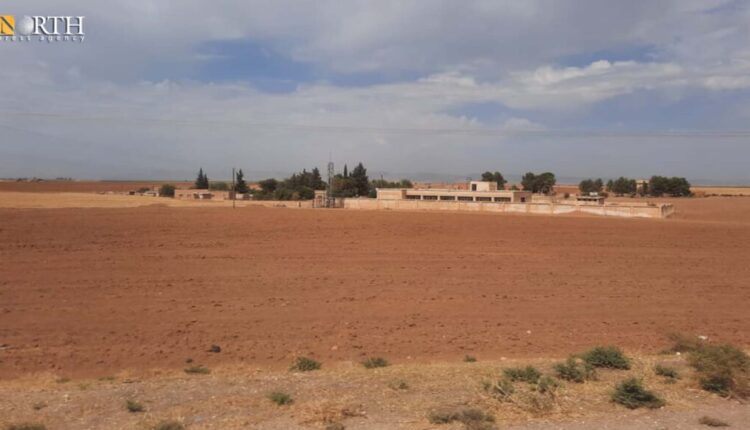
DARABASIHAH, Syria (North Press) – In the village of Jatal in the countryside of Derbasiyah town, north of Hasakah governorate in northeast Syria, Muhammad Ali Sheikh, 50, rushes early in the morning to feed his hungry in anticipation for the shelling that may begin at any moment.
Ali sheikh said, “We arrange our lives according to the Turkish shelling. We try to finish our work before the shells fall.”
He lives, like other residents of villages and towns in northeast Syria on the border strip with Turkey, a state of instability because of continued Turkish shelling which prevents them from living their normal lives.
During the shelling, farmers cannot take care of their lands, workers stop working, schools are closed, and markets are stopped.
Recently, Turkey and its affiliated armed opposition factions, known as Syrian National Army (SNA), escalated their attacks on cities, villages and towns adjacent to the border.
“Before, we were not obliged to live such life. We cannot work or meet our family and neighbors,” Ali Sheikh described their condition under shelling.
Residents are afraid of leaving their houses. Children are afraid of going out to play far from the eyes of their parents due to the Turkish shelling that may takes place at any moment.
Last month, when the shelling intensified, the man left his house and headed with his family to the city of Qamishli.
The family returned a week after the bombing stopped.
Ali sheikh said sadly, “I have not gone to my land for a week. The bombing does not let us to complete our work or educate our children.”
“We will not leave our village”
According to the residents, the Turkish forces target their area with shells. Sometimes, the border guards fire indiscriminately at the villages adjacent to the border.
Despite the risks, Ali Sheikh insists on staying in his village saying, “The Turks want to displace us from our villages, but we will not leave our village, I will live and die in my land.”
Last month, the Turkish forces and SNA factions target the areas of Ain Issa and Tel Abyad, north of Raqqa, the towns of Abu Rasin (Zirgan), Tel Tamr, Derbasiyah, Amuda and the city of Qamishli, north and northwest of Hasakah.
The 58-year-old Sa’id Khalil lives a state of constant anxiety and fear of the Turkish military escalation in the village of Tel Hamdon, in the countryside of Amuda, west of Qamishli.
Khalil said, “We live under the threat of bombing. I fear for my children and my house to be targeted with a shell.”
“Every day, there is shelling or shooting. People are starting to hate their lives. One can only see people running. People who are going to work turn around and come back home.”
He wondered in an angry tone, “Look, where are the military posts in this village? They are all civilians, children, women, men and the elderly. When they hit one of these small houses, what do they think it is? Is it a weapons factory?”
“How we live”
The renewed Turkish bombing caused a limited wave of displacement among the residents of the targeted areas towards the southern regions far from the border.
With the Turkish threats continuing, the border areas are witnessing a clear increase in the migration of the population outside the country or towards Hasakah city, and areas far from the Turkish border.
Khalil talks about the state of panic during the bombing, saying, “They hit us with mortar shells. The children are so frightened. They hide under the covers, thinking that they will protect them.”
“We do not maintain anything in our houses anymore when they are hit by a shell, because we expect that the Turks will re-shell the village and demolish the house.”
Khalil’s wife suffers from diabetes, and the doctor told him that she had high blood sugar “as a result of her poor psychological state.”
The 64-year-old, Youssef Mansour, a resident of Tel Ziwan village in the countryside of Qamishli, wonders about the reason for the Turkish attacks on north and east Syria and its people.
Mansour said, “If someone has a child outside, he should look for him like a madman to protect him.”
“They hate us and if we do anything they will beat us. They do not differentiate between a military and a civilian,” he added.
With the start of the new school year, residents are worried when they send their children to school in light of the constant fear of renewed Turkish shelling of their villages.
Mansour added, “The Turks have disrupted all of our lives. We do not know how to work? How do we live? How will our children learn in light of this constant tension and anxiety?”
